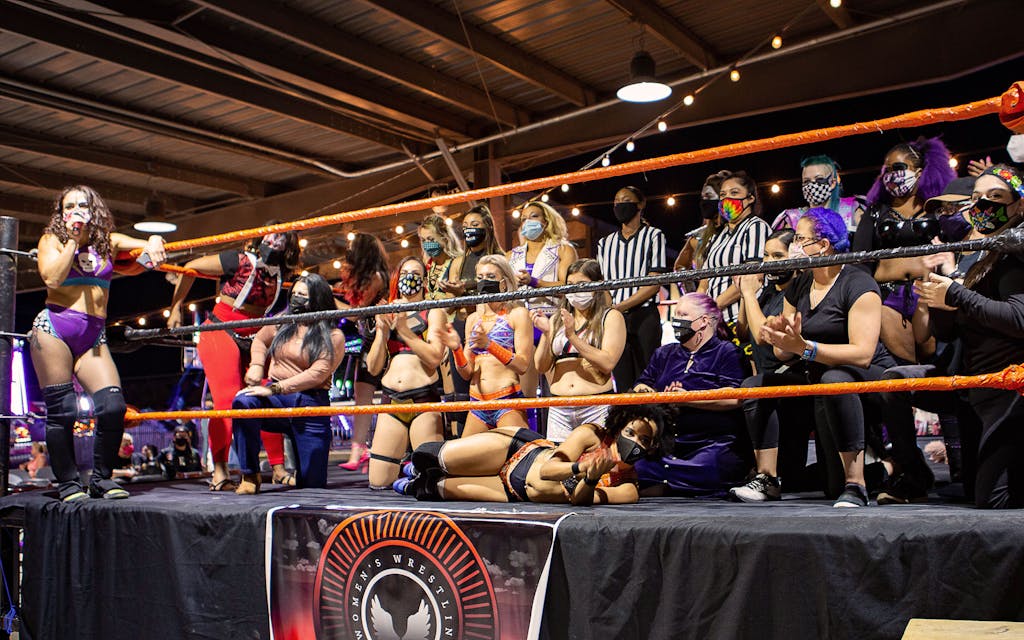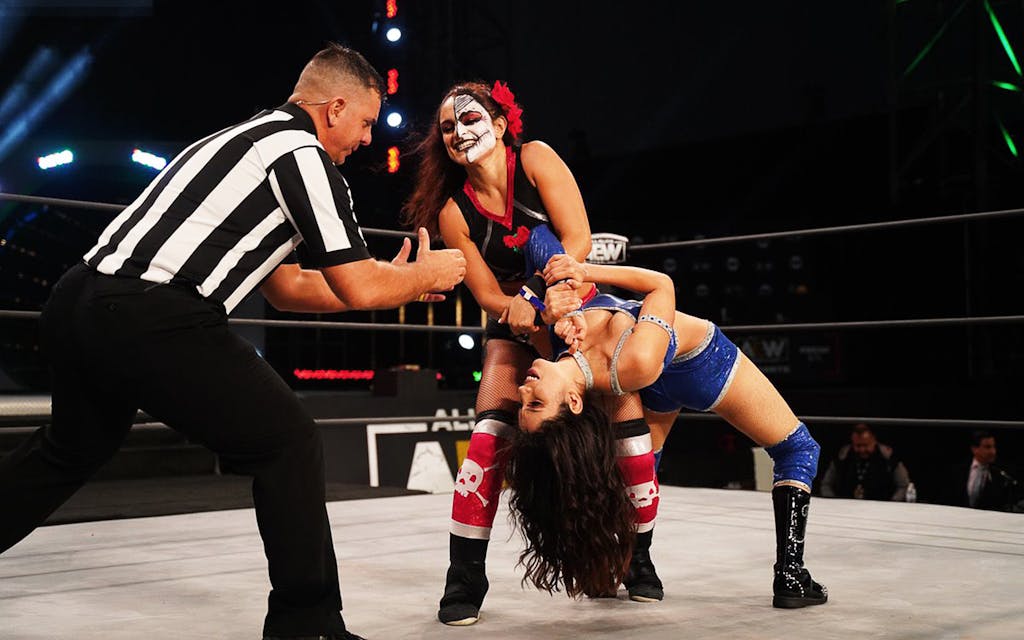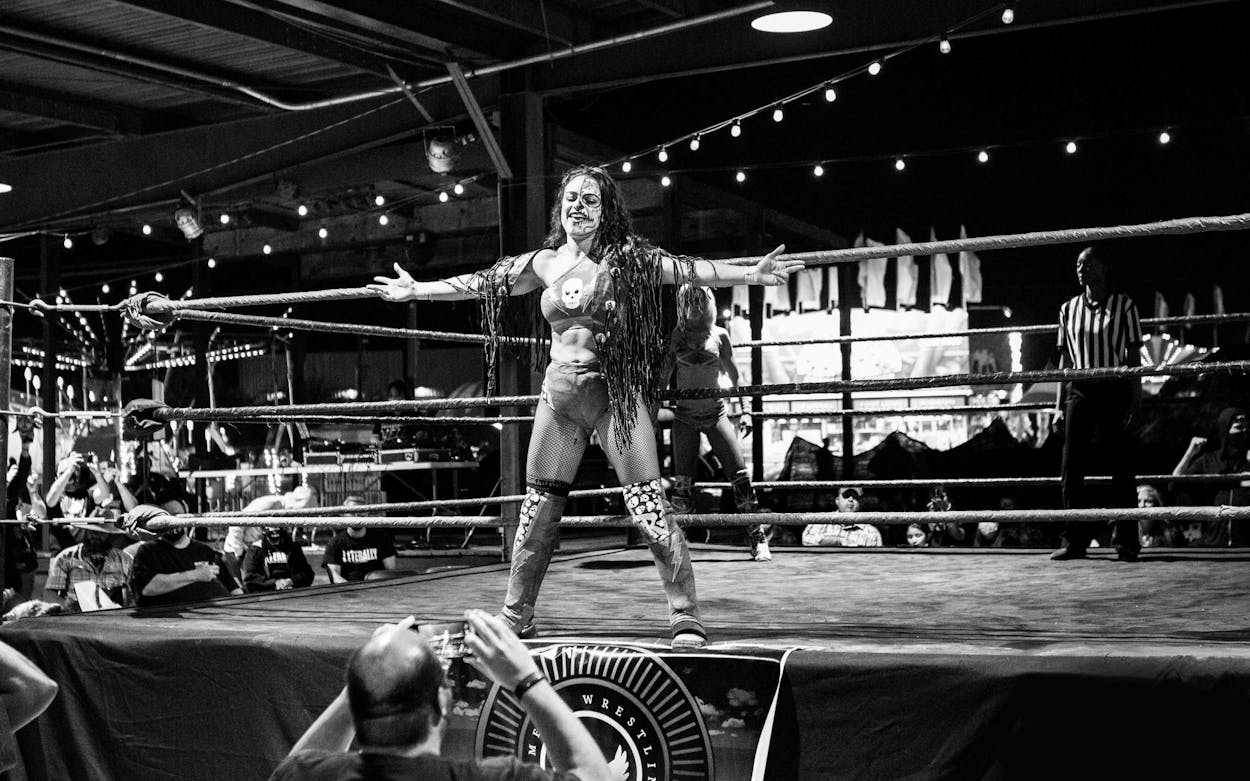On a recent Friday night at Pinballz Kingdom, a venue located just outside Austin, colorful characters tussled in highly theatrical, in-ring wrestling battles before clusters of masked and intermittently distanced fans (which included, for some reason, a man dressed as Scooby-Doo). But to the uninitiated viewer, something else might have stood out about that mid-December performance—all eighteen of the night’s wrestlers happened to be women. So was each match’s referee. Ring introductions were done by a woman, as was were the play-by-play and color commentaries on the event’s online broadcast, which was shot by a team of female videographers. Anyone who stepped behind the curtain to experience the meetings where the action was planned would have found that women called all the night’s shots too.
Mission Pro Wrestling, one of the latest additions to the loose network of local and regional outfits comprising the burgeoning indie wrestling industry (which currently includes at least eighteen other Texas-based operations), hosted the event—its third staging in as many months at the entertainment complex off Interstate 35, in Buda. It also marked a milestone for the burgeoning production: that night, Mission Pro crowned its first champion. On hand to present the title was Debrah Ann Miceli, a WWE Hall of Fame inductee best known by the noms de guerre Madusa and Alundra Blayze. “I’m here because of one person, but yet many people,” Miceli said to the crowd of two hundred in a preshow speech, which I streamed, along with the show, on Title Match Network. “I was asked to come here for Thunder Rosa—and, of course, to support Mission Pro.”
Misson Pro is led by Thunder Rosa, the alias of San Antonio resident Mel Cervantes. The indefatigable 34-year-old Tijuana native spent this past year becoming one of American wrestling’s breakout stars. She reigned for nine months as women’s champion of the Atlanta-based National Wrestling Alliance, still her her primary employer, while moonlighting prominently for All Elite Wrestling, an acclaimed year-old outfit whose prime-time show on TNT is one of Wednesday night’s top-rated cable programs.
Cervantes has become an outspoken advocate and do-everything head of female-powered Mission Pro, the buzziest new “promotion”—industry jargon for “company”—in indie wrestling. “If you want to make a change,” says Cervantes, who counts the labor activist Dolores Huerta among her role models, “you might not have time to sleep.”
In a social media movement dubbed #SpeakingOut, scores of women in the wrestling world have come forward to share stories of gender-based abuse and mistreatment—including rape, assault, and harassment—across the major and small-time indie levels, both stateside and in Europe. Though consequences varied widely in severity, several accused wrestlers were let go (including three employed by WWE) and the United Kingdom announced a formal parliamentary inquiry into Britain’s wrestling industry.
Cervantes was moved by the revelations. A graduate of the University of California at Berkeley, she had been working as a social worker in the Bay Area when she began wrestling on weekends in 2014, before quitting to pursue it full-time three years later. “From the moment I started volunteering for the shows, the guys were like dogs,” Cervantes says. Lewd comments were de rigueur, and one male wrestler, Cervantes says, made a habit of touching her without permission. “If this was a real job, I think a lot of people would get fired,’” Cervantes recalls confiding in her husband, Brian, at the time.
But wrestling’s lack of formal structure, especially on the independent level, makes accountability hard to find. Wrestling promotions are typically loosely organized outfits in which a single boss—who in many cases is also a performer—hires performers as independent contractors via handshake deals for one-off gigs. When such environments are dominated by men, many women see their objections downplayed or dismissed. Others say they feel pressured to play along, rather than risk falling out of favor in a business in which networking and relationships can make or break a career. The result is what Cervantes calls a “code of silence” that can stifle women who feel compelled to stand up for themselves. “It was a culture,” Cervantes says.

At first Cervantes was hesitant, given her workload. But she knew that a female-led space could be an oasis in an industry in which women are often not even afforded separate locker rooms or changing areas, and where even organizations spotlighting women in the ring can be hostile backstage. “I’ve worked in so many quote-unquote ‘female’ promotions that are run and booked by men,” Cervantes says. “It’s just the same shit.” Employing women in all of a wrestling promotion’s roles, she realized, could set them up to succeed in the business across the full spectrum of positions, ultimately increasing gender parity beyond the ring and helping to make wrestling a more inclusive place. So, she told Brian: “Let’s do it—fuck it.”
Following the announcement of Mission Pro’s new direction, in June, sponsors like Jawsh, a local apparel company, and Austin’s Fight Back CBD soon reached out to get involved; fans and other supporters didn’t hesitate to lend their financial support. “People literally opened their wallets and were like, ‘Here’s a hundred bucks, get it done,’” Cervantes says. The influx of capital enabled Mission Pro to buy its own wrestling ring (a significant expense for start-up promotions) and camera equipment for its side venture of filming custom studio matches commissioned by fans. It also meant that once Mission Pro ran shows, Cervantes could afford to pay performers their full booking fees—sums often negotiated down by independent promoters looking to compensate wrestlers with greater “exposure” of their work—and not skimp on the transportation and backstage amenities on which she knows many companies cut corners.
She did not have to look hard for talent, having already built an extensive network of contacts through her years in the industry. Some sought her out, like Carlene “Jazz” Moore-Begnaud, a two-time champion in WWE in the aughts who joined Mission Pro in a wide-ranging mentorship role behind the scenes. Like many, Moore-Begnaud says she was drawn both to the company’s mission and the opportunity to work with Cervantes. “She’s self-made,” says Moore-Begnaud, who lives in Houston. “She’s about doing the right thing. She really cares. She’s got love and respect for the business—for the business—of wrestling. And she’s willing to share this with the girls.”
In September, the revamped Mission Pro made its debut in the open-air space behind Pinballz, with capacity capped at around two hundred and mask and distancing guidelines in place. The event sold out quickly and was streamed online via Title Match Network. It also established an encouraging environment behind the curtain, where, as in many entertainment ventures, the competitiveness among performers jockeying for status can be cutthroat.

“I’ve never felt so comfortable,” says Rachel “Ray Lyn” Kelvington, a Pittsburgh-based wrestler who worked Mission Pro’s second show, in November. At other shows, she says, “It can be real ugly backstage. That’s where all the shit is going down, honestly. This wasn’t like that. This was a very supportive, very loving atmosphere. Everybody was trying to help each other because if we succeed, we succeed together.”
Women in wrestling have long fought to prove that they deserve more than being relegated to what Moore-Begnaud refers to as “a popcorn match—when we come out, that’s the time you go to the concession stand.” Mission Pro’s ethos emphasizes its performers’ athleticism and theatrics, and matches are quickly paced, hard-hitting, and compelling, eliciting the animated (and masked) cheers, boos, and chants that wrestling shows thrive on. “The most important part is that yes, we can be sexy, we can be feminine, but I want people to see us as professional athletes, equally to men,” explains Cervantes. Mission Pro’s roster, which Cervantes says also welcomes transgender and gender-fluid athletes and crew, has, in her words, “done an excellent job to portray that … we can sell. And we need to be respected.”
In her role at Mission Pro, Cervantes has also made a point to open doors for underrepresented wrestlers, particularly women of color. “There’s such diversity on the card—Black, white, Latinos. You name it, they’re on the show,” says Moore-Begnaud. “That’s a wonderful thing. Me being African American from a little small town, now people like me are getting more opportunities.”
To that end, Cervantes and Moore-Begnaud recently opened a wrestling school in San Antonio with Moore-Begnaud’s husband, the former WWE wrestler Rodney Bregnaud (a.k.a. Rodney Mack), where they have begun training a new crop of hopeful men and women. Cervantes is also forming “a collective of women” to lead seminars on how to navigate unpleasant realities of the wrestling business, such as harassment and exploitive contracts and business arrangements. When working internationally becomes feasible again, Mission Pro plans to sponsor scholarships for women looking to gain the valuable experience Cervantes received from wrestling in Japan and Mexico without enduring accompanying financial hardships. She has her sights set on Mission Pro scoring more visible platforms via YouTube or TV, as well as cross-promotional work with other wrestling companies. “We’re planning to take over,” she says.
But Cervantes aims to measure Mission Pro’s success by more than just wrestling’s typical metrics of viewership and gate receipts. She hopes to see its alumnae represented through all levels of the business, in a range of positions, helping to make clear a message that has often gone unheeded.
“We are not just somebody they can use and abuse,” Cervantes says. “We have rights, we have families, we have dreams, and we need to be treated with respect. There’s a lot of groundwork to do. And we are just starting.”
- More About:
- Sports






